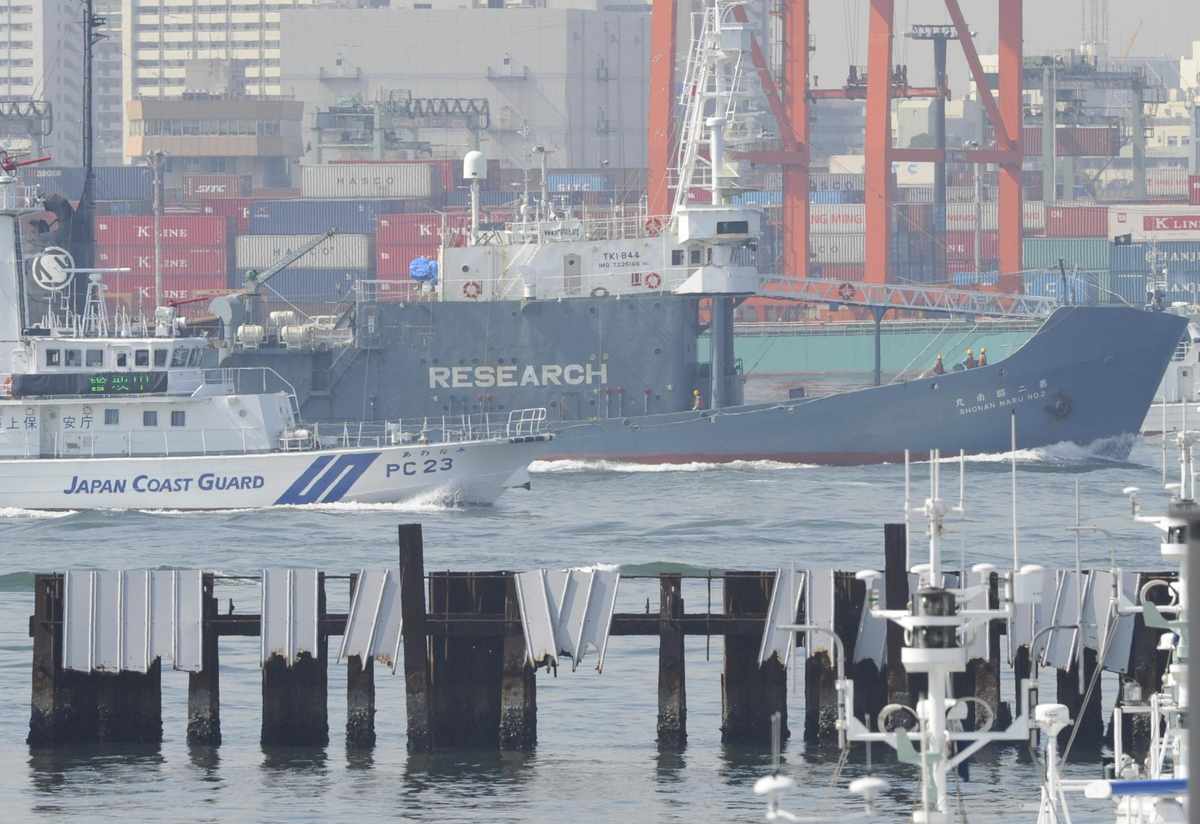JCG Sent Senior Official to Request Anti-Whaling Activist’s Extradition; Paul Watson’s Greenland Detention Hits 4 Months

Shonan Maru No. 2, rear, is accompanied by a Japan Coast Guard patrol boat in Tokyo Bay as it carries a Sea Shephard activist to Harumi Wharf in March 2010
17:22 JST, November 22, 2024
The Japan Coast Guard dispatched a senior official to Denmark in late September to directly request the extradition of anti-whaling activist Paul Watson, who was detained in Greenland in July under an international warrant issued by Japan on suspicion of obstructing Japan’s research whaling, it has been learned.
However, the Danish authorities have put the decision to extradite him on hold, and his detention passed the four-month mark on Thursday. If he were released, there are fears that dangerous acts of sabotage may flare up again.
According to JCG sources, the director of its Guard and Rescue Department, which investigates maritime crimes, and officials from the Criminal Investigation Division left for Copenhagen on Sept. 24 and stayed there for nearly a week. They held discussions with senior Danish Justice Ministry officials among others and discussed Watson’s involvement in acts of sabotage before requesting an early extradition again.
The Danish authorities did not specify a timeframe for extradition. A JCG official said that the unusual dispatch of the director “was not intended to question the pros and cons of whaling, but to show that we are aiming for an arrest based on the law and on evidence.”
The JCG in 2010 issued an arrest warrant through Interpol for Watson, now 73, who is the founder of the Sea Shepherd anti-whaling group, on suspicion of ordering the sabotage of whaling ships in the Antarctic Ocean. There were four charges alleged — assault, obstruction of business, ship trespass and property damage.
Initially, a blue notice was issued requesting the discovery of his whereabouts. It was then switched to a red notice requesting his arrest in 2012.
The response to the notice is left to the discretion of Interpol member countries, and the Greenland police detained Watson on July 21 when he arrived in Nuuk on a ship with members of the Captain Paul Watson Foundation based on the arrest warrant. The JCG requested his extradition through diplomatic channels ten days later.
Contradiction
With Watson’s detention now lasting for four months, the Danish authorities have still not decided whether to extradite him. In the Danish autonomous region of Greenland, indigenous peoples go whaling, but the Danish government takes an anti-whaling stance at international organizations such as the International Whaling Commission. This contradiction is thought to be one of the reasons why the extradition of Watson has been delayed, even though he was detained in accordance with an arrest warrant.
During this time, Watson has applied for political asylum in the anti-whaling nation of France, where he had lived, and has also applied for French citizenship in an attempt to avoid extradition.
Watson was detained in 2012 in Germany based on an international arrest warrant issued by Costa Rica but was released on bail before being extradited and fled.
Acts of sabotage
The JCG and the whaling industry are fearful of the resumption of violent acts of sabotage in Japanese waters if Watson is released on bail.
No sabotage against whaling ships has been reported since Japan stopped research whaling in the Antarctic and shifted in 2019 to the commercial whaling only within Japan’s territorial waters and exclusive economic zone. However, this year, Watson’s foundation suddenly declared an operation to intercept the Japanese state-of-the-art whaling vessel Kangei Maru. The group was detained in Nuuk, where it had stopped to refuel en route to the North Pacific.
The president of Tokyo-based Kyodo Senpaku Co., which conducts commercial whaling using the Kangei Maru and other vessels, said, “We are worried that the kind of sabotage that occurred in the Antarctic may occur in the seas around Japan, endangering our crew and our ships.”
If activists’ ships appear in the waters around Japan, the JCG will likely have to provide security to protect whaling ships in the same way that it is currently protecting Japanese fishing boats from Chinese Coast Guard vessels off the Senkaku Islands in Okinawa Prefecture.
Top Articles in Society
-

Producer Behind Pop Group XG Arrested for Cocaine Possession
-

Man Infected with Measles Reportedly Dined at Restaurant in Tokyo Station
-

Man Infected with Measles May Have Come in Contact with Many People in Tokyo, Went to Store, Restaurant Around When Symptoms Emerged
-

Woman with Measles Visited Hospital in Tokyo Multiple Times Before Being Diagnosed with Disease
-

Australian Woman Dies After Mishap on Ski Lift in Nagano Prefecture
JN ACCESS RANKING
-

Producer Behind Pop Group XG Arrested for Cocaine Possession
-

Japan PM Takaichi’s Cabinet Resigns en Masse
-

Man Infected with Measles Reportedly Dined at Restaurant in Tokyo Station
-

Israeli Ambassador to Japan Speaks about Japan’s Role in the Reconstruction of Gaza
-

Videos Plagiarized, Reposted with False Subtitles Claiming ‘Ryukyu Belongs to China’; Anti-China False Information Also Posted in Japan























